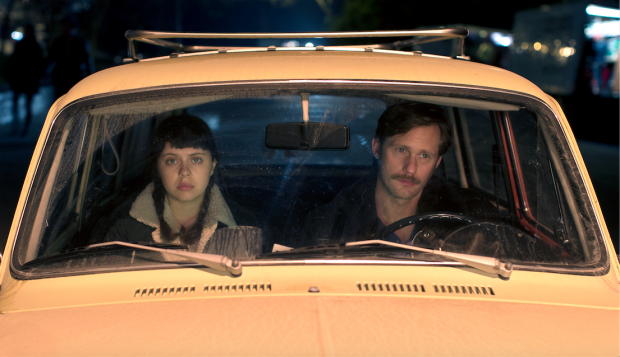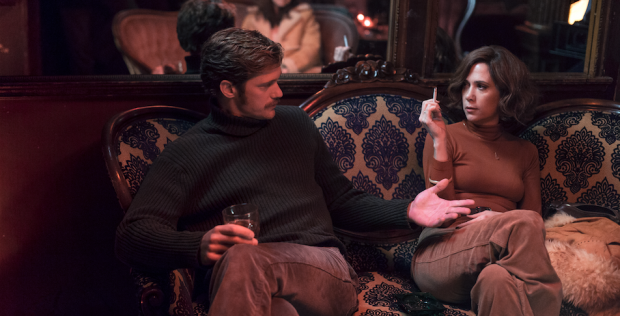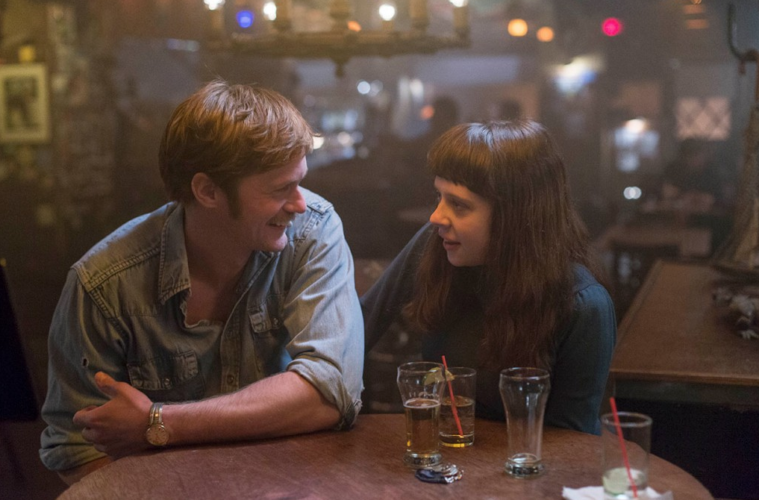
In his latest project, The Diary of a Teenage Girl, actor Alexander Skarsgård shows a completely different side of himself. For starters, the Swedish actor exhibits an exceptional skill for comedy in Marielle Heller’s extraordinary debut film. He plays Monroe, a complete manchild who strikes up a relationship with his girlfriend’s 15-year-old daughter, Minnie (Bel Powley). Skarsgård isn’t just playing a pedophile, but much more than that – and that’s exactly what the actor wants to hear.
It’ll be interesting to see how general audiences respond to Monroe. Even at the film’s Sundance debut, where the film was received more than warmly, some viewers were clearly thrown off by the three-dimensional the depiction of Minnie and Monroe’s relationship is – which has its highs and lows, all told from Minnie’s point-of-view.
It’s a beautiful and honest depiction of Minnie’s experience, and we were lucky enough to discuss her story, the film, and Monroe with Alexander Skarsgård at the press day. Here’s what he had to say:
The Film Stage: Can you comfortably watch your own work?
Alexander Skarsgård: The first time I see something I very much dissect my performance. I do think, Ah, no, I’m terrible here. Why am I doing this? Ah, shit, they chose that take? It’s difficult for me to objectively get into the movie. Still, it obviously is, but in this case, before Sundance, it was great to have seen it before the premiere. I was able to relax more and enjoy the experience of watching it with other people.
It’s a movie that says a lot about the viewer. Monroe’s relationship with Minnie is not a one-dimensional depiction of pedophilia. If a viewer was just completely repulsed by him…
Well, we’ll see. We’ve been going around to a couple of festivals and screened the film in London, Germany, and other places – and it’s been really interesting. When we had the conversations at the Q & A’s they’ve been intelligent discussions. People have been very engaged. I haven’t felt like… I guess it’ll be different once it comes out. We’ll see what the reaction will be.
The goal was to make it uncomfortable and a bit confusing – and that’s when it becomes interesting: when you can’t label the characters. That would’ve been too easy. If I played Monroe as a villain or a predator, it’d be too easy for the audience to say, “Oh, that’s just a bad guy.” For me, it’s more interesting if the audience says, “Oh, that’s a bad guy. Wait, I kind of like him here. Oh shit, their connection is real. Wait, is it? Oh fuck, it’s not. Is it?” If it’s done that way, then it’s real. In the conversations we’ve been having, people aren’t sure – and that’s great to hear.
It’s really sensitive and thoughtful direction. The sex scenes, for example, show you everything, as uncomfortable as it might be, because it’s an excited teenage girl who would remember everything.
Exactly. She’s not a victim, either. It was just a very delicate and difficult balance, of how to play that. We had a lovely two weeks before principal photography in San Francisco where Bel, Marielle, and I just got together everyday, talked about the relationship, talked about the scenes, and to find moments where the connection is genuine and strong. Also, we needed to find moments where Monroe is a teenage boy himself, where she’s more mature than him.
Or a moment where his face just says it all, that he knows what he’s doing is wrong.
 Absolutely. I think he wants to be a teenager. I think he doesn’t really want to grow up, and because of that, his connection with Minnie is stronger than his with Charlotte. That’s right, though, in those moments he has to pull himself out of it and go, “Oh, shit, I’m a grown man. I need to be responsible. I’m in a relationship with her adult mother. I have to do the right thing here.”
Absolutely. I think he wants to be a teenager. I think he doesn’t really want to grow up, and because of that, his connection with Minnie is stronger than his with Charlotte. That’s right, though, in those moments he has to pull himself out of it and go, “Oh, shit, I’m a grown man. I need to be responsible. I’m in a relationship with her adult mother. I have to do the right thing here.”
Even when it’s all going to shit and the mother finds out, he’s like, “All right. I’ll marry you. This is the right thing to do.” It’s a terrible idea, obviously, but he’s all, “I’m a man of my word, so this is happening now.”
He’s such a funny character.
It’s so tragic, but yes, funny, too.
It’s a really funny performance. Does comedy come naturally to you?
I don’t know. I hadn’t done comedy in a while when we shot this, so it was just really exciting to find a little bit of that in the story. I just did John Michael McDonagh’s movie, War on Everyone, with Michael Pena – and I had a fucking blast. I loved it. Also, in between those two movies, I did Tarzan, which… there are some funny moments in it, but it’s an action-adventure movie, with some intense characters. I just needed something that was different. After eight months of intensity it was really refreshing to go to Albuquerque to play a corrupt, alcoholic cop.
With that McDonagh dialogue, too.
Yeah, yeah, it’s unbelievably fun. I loved it.
How valuable were those two weeks you spent in San Francisco with Bel Powley and Marielle Heller?
It was incredible. It was such a luxury just to be in a room with them to talk about the relationships. This has been Marielle’s baby for almost a decade, so she knows these characters so well. This easily could’ve been a case of her wanting, “You come in and say this, and you do this that way,” but she was so excited to have us contribute, take control of our characters, and have us try something completely different from the way it was written. She was so inviting, to see where we could take a scene or take the characters.
Is that a rare experience?
It kind of it is. As a director, letting go of control… she was incredibly in control and knew the characters, but she was also excited to be surprised, even on the day we were shooting. If we blocked something we had talked hours about and then if something didn’t feel quite right or contrived, Marielle would be the first one to say, “Let’s try something different and see what happens.” We’d try it. Occasionally it would work, sometimes it wouldn’t, and sometimes something new and completely different would just spring out – and I just love those moments. That means it’s alive on set that you’re working with people who are excited about spontaneity – and Bel and Kristen felt the same way. Those are the best collaborations.
Do you recall any specific happy accidents?
I remember we had some fight scenes and the acid trip were scenes we had talked about a lot but intentionally had not rehearsed, where stuff just happens. Brandon [Trost], the DP, was just amazing, because not once did I feel like I just had to adjust for him. We only had 25 days, so it was a tough shoot, but we could always try something completely different if we needed to. Because it was such a small budget and small movie, everyone was there because they loved the project and Marielle. Half the crew was friends of hers or grew up with her.
It reminded me of when I first started in Sweden in small indie movies, where there’s no luxury at all and you’d just be lugging equipment. It’s all about the work and everyone is genuinely excited, in front of and behind the contract. This wasn’t one of those, “Oh, it’s a good paycheck. When do I get to go home?” [Laughs] Everyone was in it.

As you said, Ms. Heller knows these characters inside and out, but you also had the graphic novel, in addition to the script. What was maybe something that stuck with you about Monroe from the graphic novel?
The vitamin business was something we added very, very late. I thought it’d just be funny and sad — that he’s so delusional about this pyramid scheme business and that he’ll buy a boat and travel the world. We talked about it the Friday before our first day of shooting on Monday – and we started with the very last scene, where he’s running on the beach with the “Ask Me About My Vitamin Business” T-shirt.
I really wanted him to be wearing it, because it’s the last time you see him and it’s been some time since they’ve seen each other. When you see him at the end you just go, “Oh no, he’s still dreaming about this?” They were amazing, because it was really last minute. Over the weekend they ran out and made these T-shirts. That was something that came from the book we added later on, because I just loved it.
Those 25 shooting days, did they feel similar to working in a fast-paced environment like television?
Comparing it to, like, Generation Kill or True Blood, they were big-budget television shows, where it was just a bigger beast. The catering crew on True Blood was bigger than the whole crew on this. It’s also different because that sense of discovery isn’t the same when you had played the same character for six or seven years.
In a way, it’s a well-oiled machine. Everyone knows what they’re doing, and that’s what made it difficult, because that’s when it gets boring, creatively. That’s the challenge when you play a character for 60 or 70 hours: you need to find those moments of discovery about your character. If you don’t, it’s like creative suicide. With that said, it’s very different from doing this, where every day something is changing.
Would you want to do another series? Is it just about finding the right project?
All about finding the right project. I had the most amazing time on True Blood. I miss my True Blood family. You don’t get that experience as a freelance actor. You just get an intense relationship for a couple of months and then you move on to the next one and then the next one. It was great having that for six or seven months in a year here in LA and then five months off to do movies or travel or whatever and then comeback to my family.
With that said, seven years is a long time. At this point, I’m just excited about the freedom – the fact that I can go anywhere and jump on any project I want. I can say, “Oh, you’re shooting this for nine months in Greenland? I’ll do it.” It’s not like I have to fit it into the hiatus, because, obviously, True Blood was always in the first position.
Things I really liked came up that I couldn’t do, because the shooting schedule just didn’t work. I’m probably not going to sign another six-year contract anytime soon, but I’d love to do television. There are some amazing writers and directors in television right now.
I always like to ask: What’s maybe a performance or a movie that really blew you away as a young actor – one or two that made a big impression on you as a kid?
Well, I was a child actor, reluctantly. I didn’t want to be a child actor. For me, it was the opposite. I loved it, but I didn’t love the attention, so I quit and desperately tried to stay away from acting for eight years. Until I was 21, it just wasn’t for me. Because I realized I was shit at everything else and had nothing else I could do, why not? [Laughs]
[Laughs] Are you comfortable with it now?
Yeah. I was 13 and did a movie in Sweden that got a lot of attention, and it just made me really uncomfortable, so I said, “Fuck this. I’m not going to be an actor anymore.” I figured when I was 21 that I really missed acting – and that it was just everything around it that would make me uncomfortable. 13 is a weird age, because you’re insecure and… I thought, I’m 21 now, so maybe I should give it a go. Maybe it’ll be different. I missed being on stage and working with people on a movie set. Yeah, it’s quite different now.

The Diary of a Teenage Girl is now in limited release.

